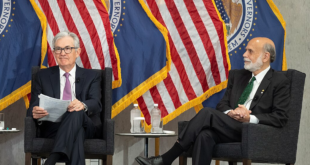Dave Smith makes the Rothbardian/Hoppean case for government restriction on immigration, arguing that it's a second-best solution given the undeniable fact of government control of "public" property. Bob plays devil's advocate to raise possible objections to Dave's framework. Rothbard, "Nations by Consent": Mises.org/HAP436a Hans-Hermann Hoppe, "On Free Immigration and Forced Integration": Mises.org/HAP436b Bryan Caplan, "A Radical Case for Open Borders":...
Read More »US States Have a Long History of Defaulting
The American bankruptcy show of the twenty-first century continues unabated with federal and state government spending. History reveals that some states have defaulted through not meeting a required bond payment, leaving the bondholders and that state’s taxpayers with a debt problem. Today, we might call a state government bond payment default a bankruptcy. Many bankruptcy filings today are governed by Chapters 7, 9, 11, and 13 of the United States bankruptcy code,...
Read More »Misunderstanding Both Lincoln and Basic Economics
Our Ancient Faith: Lincoln, Democracy, and the American Experimentby Allen C. GuelzoAlfred A. Knopf, 2024; 247 pp. Allen Guelzo has been carried away by Abraham Lincoln’s magniloquent rhetoric. Guelzo, a historian who has written a number of books about Lincoln, would like very much to believe that his hero was a champion of individual rights and economic freedom. Lincoln’s ideal for America was of a nation with a large number of small businesses, allowing people to...
Read More »Hubris Runs Rampant at the Fed
Prices will always increase, some small banks will fail, and the Fed was asleep at the switch when the run on Silicon Valley Bank occurred. Fed chair Jerome Powell admitted those three things in response to Scott Pelley’s questions on 60 Minutes. “But the overall price level doesn’t come down. It will fluctuate. And some . . . goods and services will go up, others will go down. But overall, in aggregate, the price level doesn’t tend to go down except in fairly...
Read More »Welfare for Migrants Ensures the Border Crisis Will Continue
Earlier this month, The New York Post reported that the mayor of New York is giving away pre-paid cash cards—each carrying "up to $10,000"— to foreign nationals in New York. Most of these foreign nationals—i.e., "illegal immigrants"—have arrived in New York with no invitation, no employment prospects, and no plan for housing. But most of them plan on staying. And why shouldn't they? Upon arrival, thousands of them immediately went on the public dole in some way or...
Read More »Another Reason Why Individual Freedom Is So Much Better than Central Planning
Much of the developed world is slipping into a hyperregulated malaise. Growth rates are down across most major economies, and the developing countries are catching up to our errors almost as fast as they are growing. Increasingly, even in the US you would have to be outside the norm to afford a house by age forty. The median age of a first-time homebuyer in 2023 is the same as a repeat buyer in 1981. We’re not allowed to build and grow, but we’re told everything is...
Read More »They’ll Never Pay Down the National Debt
Ryan McMaken and Tho Bishop talk with Jane Johnson about why the feds will never pay down the debt. Instead, they have two choices: rampant inflation or default. Discussed on the Show "The Federal Mega-Debt is Here to Stay" by Jane L. Johnson: Mises.org/RR_174_A Claim your free book: Mises.org/RothPodFree Be sure to follow Radio Rothbard at Mises.org/RadioRothbard. Radio Rothbard mugs are now available at the Mises Store. Get yours at Mises.org/RothMug...
Read More »The Death of Easy Money Has Been Greatly Exaggerated
Reports on the death of the present cycle of politically motivated monetary easing, in the words of Mark Twain, grossly exaggerated. Contemporary market analyses are full of how the Fed and ECB are dialing back on previous hints of Spring 2024 rate cuts. In tune with this, commentators are lauding the central banks, especially the Fed, for a show of political independence as elections approach. The bigger picture though suggests otherwise. In the economic aftermath...
Read More »Living Free in an Unfree World
The State knows no limits when it comes to intervening in the economy and our lives. From the value of our hard-earned income to the flow of water in our showerheads, nothing is out of reach for meddling bureaucrats. Ludwig von Mises explained, "The ultimate basis of an all around bureaucratic system is violence." Yet we advocate and hope for a world of peaceful cooperation and flourishing markets. It's doubtful that politics holds all the answers. We cannot just...
Read More »The Outrageous Persecution of Julian Assange
Today marks the second and final day in what could very well be Julian Assange’s last extradition trial in front of the British High Court. For almost five years now, the United States government has been working to get the Wikileaks founder extradited to the US to face charges that he violated the Espionage Act. Inspired by Daniel Ellsberg’s release of the Pentagon Papers back in 1971, Julian Assange founded Wikileaks in 2006. Assange’s vision was to develop an...
Read More » Swiss Economicblogs.org
Swiss Economicblogs.org







